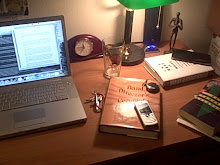This post is part of a blog project on student teaching, hosted at So you Want to Teach
Forgive typos, I haven't slept since Saturday morning and I'll edit this later.
Parents.
If there's one thing I'm going to drag away from my experiences working with the bands at Davis High, it's that parent involvement and support are probably some of the most important things in teaching any child. Whatever the subject, only a small amount of learning ever happens in the classroom and anything taught there is reinforced by learning at home. When it comes to a performing arts program, however, parental support is paramount due to all the effort required by a student outside of a classroom. Any performance program requires a regular practice regimen -akin to homework- but all the concerts, festivals, workshops, trips, everything done to make the students better musicians (and make the elective more appealing than art or yearbook), requires a substantial amount of time, effort and money on the part of the parents. Most of my students have their own instruments, many are in extra curricular performance groups and about 80% receive private lessons, and have since fourth grade. This is all a substantial financial investment on the part of the parents and reflects the affluence of the community, something I know I can't replicate when I step into my first job as a teacher.
Operational budgets for performance programs are generally barely enough to pay for routine maintenance on their instruments; let alone venues, festival fees, travel, and the ubiquitous annual "band trip." Fundraising is an integral part of every performance program I know. Those stupid candy bar scams are the first thing to come to mind but thankfully the students I work with have parents who are deeply involved in both the school and community, and the kids are able to do most of their fundraising with their instruments. The bands rent themselves out in small combos at winter time to play for christmas parties, the jazz band and choirs put on an annual Cabaret, the Madrigals hold a Madrigal dinner between thanksgiving and christmas, but the one big thing our band program does is something called a "Playathon."
I don't know whose idea this was, but it's akin to the "jog-a-thons" I did in elementary school. Kids beg for money, er collect pledges from close family and friends, either by hour or for the entire night - promising to attempt the amazing feet of playing for 12 hours, straight through the night without sleep.
This money doesn't go towards the band's operational budget, but towards the kids cost of the trips we take, some upwards of $600. Each student has their own account and the money is deposited and kept there for them, and any left over is carried over to next year's account. None of this would be possible without the Band Booster's program, and I am routinely surprised at the amount of organization and continuity in the program. They have an extensive charter and binders for each event throughout the year holding the lessons learned from the years previous and instructions on how things are done. The amount of parental involvement in this program is phenomenal and building a booster's program, or taking active involvement in an existing one will be a large priority of mine as a first year teacher.
Although too much parental involvement can lead to twitching, murderous glares from teachers, in building an amazing performing arts program, no matter how big of a pain they may be, parents are a teacher's greatest asset.
Playathon.
So.... anyways, our director is past 60, and three years ago he declared the last Playathon. The kids got so upset because they loved the program so much that alumni came in, and parents stepped up to make it happen the next year without the director, bringing in student teachers to help conduct instead. Both this year and last I was put in charge of the music, while parents put up the organizational front and provided chaperones for the entire night. This playathon went so well, I want to keep the schedule and music somewhere for next year, and this is as good a place as any.
19:00 - Kids show up, warm up, tune.
19:30 - Kids give a "Concert in progress," performing works that they've only seen since they returned from winter break. This year, the Concert Band played Longford Legend, Appalachian Morning, and ... (I'm honestly too tired to remember the other one). The Symphonic Band performed Masada, Three Dance Episodes from On the Town, The Whispering Tree, and a roaringly busy piece they got on Wednesday called "Applause," one they pulled off marvelously. With set changes, these two concerts take about an hour and a half.
21:00 - The Jazz Band steps in. They gave an hour long concert, after playing all day at the Folsom Jazz Festival today. They scored all Superiors, scores in the 90s, but our director was less than satisfied with their performance - the best part is, so were they. They're looking to place at Monterey in a couple of months and need to tighten up quite a bit to do so.
22:00 - Between ten and eleven, the pizza arrived, donated in small amounts from most of the pizza joints in Davis, a small college town with lots of pizza places. Before the kids got to chow down, we allowed guest conductors to jump in and direct the band. Mostly parents, some who have no idea what they're doing but a few are "regulars" and ham it up to the point where some of the kids are laughing so hard they can't even play right. This is another chance for fundraising, getting donations, or prizing this out at raffles.
N.B. Don't loan your baton out to someone who doesn't know how to use it. Mine was broken before I had the chance to direct.
23:00 - The fun begins. At this point we have 45 minutes of rehearsal every hour running through pieces the kids have never seen before, or at least haven't seen in a year. During the other fifteen minutes, the kids run off to a dark room with a strobe light, thumping techno music and enough sugar and caffeine to put several large animals into hyperglycemic shock. I, myself stuck to a diet of carrot sticks, wheat thins and chai tea, learning from last year that a steady diet of Mountain Dew inhibits my ability to direct and causes my hands to shake. I also brought in help, a few extra directors, the student director, manager and drum major of the Aggie Band, all current music majors at UCD. There's no way I could direct a band for 7 hours on my own. Working with a combined band of about 150 kids, I lost my voice as it is, and that was working with them only 15 minutes every hour.
Between 11 and 12 we started them off easy with "With Quiet Courage" "Three Ayers from Gloucster" and Holst's First Suite in Eb
00:00 - 01:00: WE decided to get the harder stuff out of the way while everyone was awake: Culloden III, El Camino Real (a beast to conduct on the fly), Holst's Second Suite in F (running the march as fast as we could).
02:00 - 3:00: Here if the kids were dragging we made them sing instead, playing arrangements of Les Mis, Aladdin and the Lion King
03:00 - 04:00: Continuing in the same vein we did Phantom of the Opera, Beauty and the Beast and Hunchback of Notre Dame.
04:00 - 05:00: Rock Bottom. This was a bad time to pull out Vaughn William's Folk Song Suite. I think the flutes were about to cry when I called it up. Between that, Mary's boy child and an arrangement of Avenue Q, it was a disaster. We should have pulled up much easier music for this late in the game.
05:00 - 06:30: To rally the troops we played a bunch of their pep band music, (Black Saddles, Cortez) which with a full band, rivaled the Aggie Band in power and quality. We then set out to rehearse three pieces from the night to get them sounding decent for a concert at 7:00. - when their parents and people who threw money at them come to see them perform without any lips.
We chose Baroque Hoedown (The theme to the electric light parade in Disneyland), Beauty and the Beast and American Elegy as those pieces with the balance of "easy," "engaging," and "impressive."
06:30 - 0:700: Breakfast, keep everyone off their instruments to allow a bit of recovery.
07:00 - 07:30: Concert, a little flat here and there, with lips as droopy as their eyelids. But promising the kids that this is the last thing between them and sleep seems to rouse the spirits. And students always play better when their parents are watching.
I pushed the pace on American Elegy, but as I said, it was the only thing between me and sleep. If you look closely you can see the sun rising behind the curtains of the multipurpose room.

